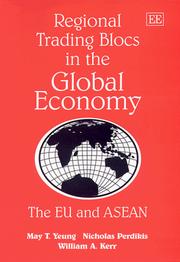| Listing 1 - 6 of 6 |
Sort by
|
Book
ISBN: 9780230314214 Year: 2012 Publisher: Basingstoke Palgrave Macmillan
Abstract | Keywords | Export | Availability | Bookmark
 Loading...
Loading...Choose an application
- Reference Manager
- EndNote
- RefWorks (Direct export to RefWorks)
Foreign trade policy --- International economic relations --- East Africa

ISBN: 1840641045 Year: 1999 Publisher: Cheltenham Elgar
Abstract | Keywords | Export | Availability | Bookmark
 Loading...
Loading...Choose an application
- Reference Manager
- EndNote
- RefWorks (Direct export to RefWorks)
Foreign trade. International trade --- European Union --- Association of Southeast Asian Nations --- Asia-Pacific Economic Cooperation --- Free trade --- Trade blocs --- ASI / Asia - Azië - Asie --- EEC / European Union - EU -Europese Unie - Union Européenne - UE --- 334.153.0 --- 382.50 --- Betrekkingen tussen de Europese Gemeenschappen en de geassocieerde of derde landen: algemeenheden. --- Internationale handelsbetrekkingen: algemeenheden. --- Regional economic blocs --- Regional trading blocs --- Trading blocs --- International trade --- Betrekkingen tussen de Europese Gemeenschappen en de geassocieerde of derde landen: algemeenheden --- Internationale handelsbetrekkingen: algemeenheden --- ASEAN. --- Association of Southeast Asian nations --- European Union countries --- Southeast Asia --- Asia, Southeast --- Asia, Southeastern --- South East Asia --- Southeastern Asia --- Commercial policy.
Book
ISBN: 9781848447950 Year: 2010 Publisher: Cheltenham Elgar
Abstract | Keywords | Export | Availability | Bookmark
 Loading...
Loading...Choose an application
- Reference Manager
- EndNote
- RefWorks (Direct export to RefWorks)
Foreign trade policy --- European Union --- India --- EEC / European Union - EU -Europese Unie - Union Européenne - UE --- IN / India - Inde --- 334.153.1 --- 382.52 --- Handel, douanetarief en handelsakkoorden in de Europese Gemeenschappen. --- Handelsakkoorden. Driehoekshandel. Bilateralisme. --- Handel, douanetarief en handelsakkoorden in de Europese Gemeenschappen --- Handelsakkoorden. Driehoekshandel. Bilateralisme --- European Union countries --- Indland --- Ḣindiston Respublikasi --- Republic of India --- Bhārata --- Indii︠a︡ --- Inde --- Indië --- Indien --- Sāthāranarat ʻIndīa --- Yin-tu --- Bharat --- Government of India --- インド --- Indo --- EU countries --- Euroland --- Europe --- Commerce --- Commercial treaties. --- هند --- Индия
Book
ISBN: 3319605526 3319605518 Year: 2017 Publisher: Cham : Springer International Publishing : Imprint: Palgrave Macmillan,
Abstract | Keywords | Export | Availability | Bookmark
 Loading...
Loading...Choose an application
- Reference Manager
- EndNote
- RefWorks (Direct export to RefWorks)
This Palgrave Pivot investigates barriers to international agricultural trade caused by a lack of standardized maximum residue levels (MRL) for pesticides. As upwards of ninety percent of the food entering international supply chains will show pesticide residues, this issue poses a serious threat to global food security. Given the preponderance of pesticide use in food production and the increasing disruptions to trade, a better understanding of the reasons for the decline in international cooperation, the trade impacts, and potential solutions is critical. This volume will contribute to that understanding. Through an analysis of the economics of MRL regulatory harmonization, select case studies, and a look at incentives and disincentives for government agencies and regulators, the authors move the conversation beyond the theoretical, and into current practices and advice for creating workable solutions. This Pivot is a valuable resource for those concerned with food security, trade policy, agricultural production and export supply chains, as well as those interested in broader issues related to science policy and societal trends. .
International economics. --- Agricultural economics. --- Economics. --- Agricultural Economics. --- International Economics. --- International economic relations. --- Agriculture --- Economic aspects. --- Agrarian question --- Agribusiness --- Agricultural economics --- Agricultural production economics --- Production economics, Agricultural --- Land use, Rural --- Economic policy, Foreign --- Economic relations, Foreign --- Economics, International --- Foreign economic policy --- Foreign economic relations --- Interdependence of nations --- International economic policy --- International economics --- New international economic order --- Economic policy --- International relations --- Economic sanctions --- Economic aspects
Book
ISBN: 9781783474714 9781783474721 Year: 2014 Publisher: Cheltenham Elgar
Abstract | Keywords | Export | Availability | Bookmark
 Loading...
Loading...Choose an application
- Reference Manager
- EndNote
- RefWorks (Direct export to RefWorks)
National consumption --- Economic law --- Nutritionary hygiene. Diet
Digital
ISBN: 9783319605524 Year: 2017 Publisher: Cham Springer International Publishing :Imprint: Palgrave Macmillan
Abstract | Keywords | Export | Availability | Bookmark
 Loading...
Loading...Choose an application
- Reference Manager
- EndNote
- RefWorks (Direct export to RefWorks)
This Palgrave Pivot investigates barriers to international agricultural trade caused by a lack of standardized maximum residue levels (MRL) for pesticides. As upwards of ninety percent of the food entering international supply chains will show pesticide residues, this issue poses a serious threat to global food security. Given the preponderance of pesticide use in food production and the increasing disruptions to trade, a better understanding of the reasons for the decline in international cooperation, the trade impacts, and potential solutions is critical. This volume will contribute to that understanding. Through an analysis of the economics of MRL regulatory harmonization, select case studies, and a look at incentives and disincentives for government agencies and regulators, the authors move the conversation beyond the theoretical, and into current practices and advice for creating workable solutions. This Pivot is a valuable resource for those concerned with food security, trade policy, agricultural production and export supply chains, as well as those interested in broader issues related to science policy and societal trends. .
Foreign trade. International trade --- Agronomy --- landbouwbeleid --- wereldeconomie --- internationale economie
| Listing 1 - 6 of 6 |
Sort by
|

 Search
Search Feedback
Feedback About UniCat
About UniCat  Help
Help News
News